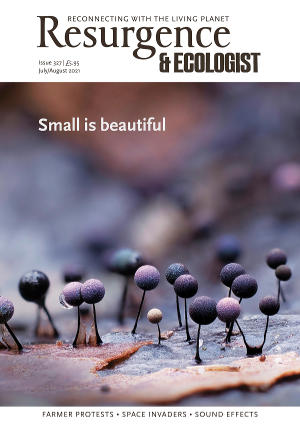My initial thought on being asked to review this book was that I’m not the right person. I feel supremely underqualified: Rupert Read is a professor of philosophy, he managed to get the BBC to change its policy on reporting climate change, and he has been a national spokesperson for Extinction Rebellion and the Green Party. I’m just an ordinary knackered mum of two.
My whole philosophy around sustainability is Sustainable(ish) – about imperfect eco-action, challenging the eco stereotypes, and trying to make it accessible for all. And this is a very different approach from that taken by Read in this book.
The enormity of the climate crisis always threatens to overwhelm me. I think it’s one of the big reasons why so many people fail to engage with it. It feels too big to tackle. Read refers to this in the book when he lays out “the abject direness of our predicament”, saying: “I’ll briefly rehearse the things you don’t want to hear.” It’s a difficult book to read, precisely because it is telling us the things we don’t want to hear. I absolutely support his premise that as parents we love our children above all else, and the paradox that he is calling out – that the majority of us are failing to act on the biggest threat facing our children, the climate crisis.
According to Read, what we now need to do, if we really love our children, is devote the vast majority of our time and/or money to fighting the climate crisis. But that’s a big ask. Even for someone who considers themself invested in this fight, who wants to do whatever they can, that felt like a big ask. A big guilt-inducing, anxiety-inducing ask.
I feel so conflicted after reading this book. I understand the science. I understand the “direness of our predicament”. I understand that this is an emergency, and that therefore we need to act as if it’s an emergency. Yet still, personally, I feel a huge resistance to the actions prescribed. And I’m aware that that probably makes me a very bad environmentalist.
After a year of a global pandemic and everything that that has thrust upon us, to be expecting anything other than ‘survival’ at the moment from parents feels hard, and, as I’m discovering myself, albeit with a very different approach, it’s a difficult subject to even start to broach. What we’re being asked in this book is to look beyond our day-to-day ‘survival’ and look much, much wider, at the survival of our species.
I read the book wanting answers, wanting to know what I could DO. There are answers, but maybe they aren’t the answers that I wanted – or indeed the answers that I think the vast majority of parents will want. That doesn’t mean it’s not what we need to do. But it’s possibly too big a step for many parents not already engaged in the climate crisis (and indeed for many who are).
I’m not sure that Parents for a Future is a mainstream book, or, sadly, that it will appeal to a mainstream audience. It should do. It needs to. There is no such thing as too extreme when we’re in the middle of an emergency. For some this book will be the call to action that they need. It will be the push they need to set up a local Parents for a Future group, or to start attending local council meetings. Others might need a gentler way to get started. If this book isn’t for you, find a different way. Find your way. We need everyone to make a start.







